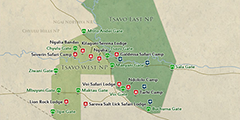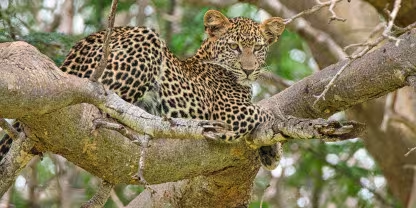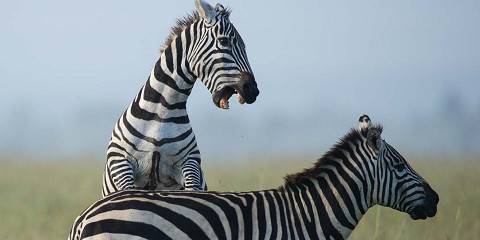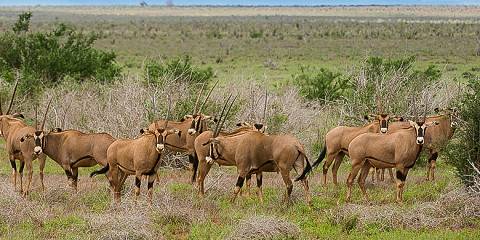Tsavo East National Park is a superb place to watch wildlife. It’s a vast, semi-arid wilderness populated by elephants, sometimes in large herds and caked in the red Tsavo dust, and unique maneless lions. Tsavo’s wild and sunlit plains host other highlights, from cheetahs on the hunt to gerenuk and Somali ostrich, which you can rarely see elsewhere this far south. And if you range beyond the main track through the park, it can feel like a real adventure.
-
Best Time To Go
- June to October and January to February (Best for general wildlife viewing; little rainfall)
-
High Season
- December to March and July to October (Not busy)
-
Size
- 13,747km² / 5,308mi²
-
Altitude
-
171-845m /561-2,772ft
 View Photos
View Photos
 View Photos
+24
Photos
View Photos
+24
Photos
 Open Map
Open Map
Pros & Cons
- Superb wildlife viewing
- Excellent birding includes many dry-country specials
- Great wilderness appeal with off-the-beaten-track options
- Beautiful landscape with scenic landmarks such as the Galana River and Mudanda Rock
- The most accessible park for visitors from the coast
- Wildlife densities can be low
- Temperatures can be very hot for much of the year
Wildlife
Tsavo East is home to the Big Five, although black rhino is not usually seen. The park is a stronghold for elephants, and you’ll commonly find them with a reddish appearance from the distinctive red soil of the area. Tsavo is also famous for its maneless lions.
More about Tsavo East’s wildlifeScenery
If you stay close to the park’s main thoroughfare, you’ll experience barren plains, grasslands and semi-arid shrub. The plains either side of Aruba Dam can be good for cheetahs. A slight detour brings the Kanderi Swamp (popular with elephants) and Voi River (with lush riverine forests) into play. Nearby, Mudanda Rock, a towering formation, offers sweeping views from its summit. The wild, croc-filled Galana River runs through the park, with Lugard Falls a highlight. North of the river is a vast wilderness area that includes the Yatta Plateau.
Activities
The only two activities permitted in Tsavo East National Park are wildlife viewing and birding, both of which you’ll most likely enjoy on a guided game drive. Self-guided game drives are possible, although they’re not very common in Kenya.
Weather & Climate
Conditions stay hot and dry throughout the year at Tsavo East. The Wet season (November to May) gets particularly hot, especially during the break between the rains at year’s end and during the later long rains. The Dry season (June to October) brings a little relief from the heat.
More about the weather and climateBest Time To Visit
Tsavo East doesn’t always look its best in the Dry season (June to October), when the sky can be hazy from the dust, but this is the best time to spot animals. The dry, hot months of January and February are also good. The grass is much shorter than in the Wet season (November to May), so wildlife is less easily concealed by vegetation. And, of course, getting wet is not an issue.
More about the best time to visit



